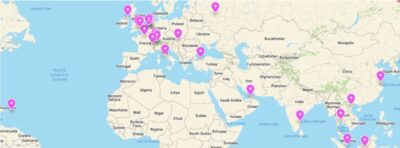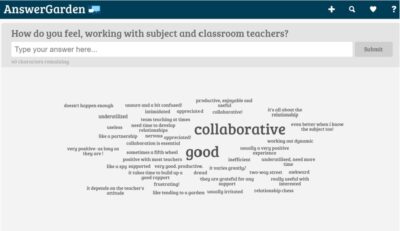What we learned
The first task of the International School SIG was to think global. Our aim was to create a forum to facilitate the sharing of EAL knowledge, experience and research, whatever the time zone. To have a wide reach, we scheduled termly online meetings, created a dedicated blog and utilised social media much more. This meant what we learned was that the group could support EAL educators in a format that would work for everyone, no matter where in the world they were.

In October 2021, our first meeting was attended by almost fifty participants from ten different countries who tuned in to hear our guest speaker, Eowyn Crisfield. Eowyn’s presentation began by questioning the way market value is attached to curriculum languages, often to the detriment of home languages. Eowyn went on to examine the complexity of language programmes available and the importance of individual language profiles. Cohesive language provision that connects modern languages, EAL and a home language programme should be central to the work of international schools. She ended the presentation with a call for educators to become action researchers and build networks so that we can bring discourse around language to the forefront of the conversation in international education.
The goal of our second meeting was to create a platform for practical, small group discussions on how EAL specialists work with classroom and subject teachers. We were again joined by around fifty participants from almost twenty countries. We began by gauging how EAL professionals generally feel when working with subject and classroom teachers, and we were thrilled to hear that most see it as a positive, collaborative experience.

However, we also heard that many are unsure of their role in the classroom and can feel under-utilised. To dig deeper into what makes a good experience, we separated into breakout rooms to discuss:
- The EAL teacher’s role in the mainstream classroom
- Information flow and time saving ideas
Many teachers highlighted how their schools value EAL specialists and allow planning time that supports the development of successful collaboration. This works particularly well if the EAL teacher already has some subject knowledge or the subject teacher has some understanding of multilingualism. This clearly suggests that whole school professional development, and the support of senior leaders is still critical in facilitating partnerships that have a positive impact on English language learners. Most members agreed that there is no one model of co-teaching or co-planning that works in all situations.
Pragmatism and building mutual trust is critical, as is finding a way to develop that over time. Meeting at the start of the term, either online or offline, to lay out key aspects of the curriculum is effective only with regular, productive communication throughout so that both teachers can discuss approaches to upcoming material and monitor the progress of all students.
Many of our members also felt that developing a language profile for each student starts with the Admissions department allowing families to tell their own story of language use. This information, as well as knowledge of a student’s hobbies, interests and motivations should be shared with all of the child’s teachers to make settling in as comfortable and positive as possible. Examining and communicating educational expectations is also important, as are conversations about the role of parents, teachers, and the students themselves. Students may be used to socialising at school and studying with a tutor in the evenings, or memorising content and studying grammar rather than focusing on meaning, and applying knowledge in class.
Suggestions included creating a presentation or video that explains to students and their families how their new school works, and a clear homework schedule that specifies time expectations. A small number of students follow an additional curriculum simultaneously, as they also take national exams that are equally important to their future. The understanding of a student’s context informs our professional relationship with them and should be shared with all of their teachers.
We are looking forward to welcoming the fantastic Tan Huynh as our next guest speaker on May 19th and would like to say thank you to both NALDIC and everyone who has become a member of the group already. If you want to know more about the NALDIC International School SIG, please do keep an eye on Twitter @kiltedkate and @lorna_caputo or check out our Facebook page.


